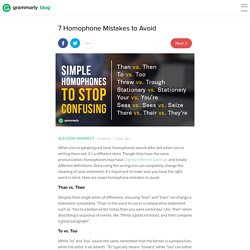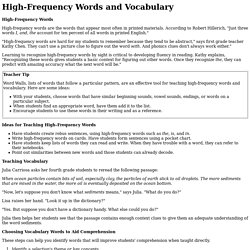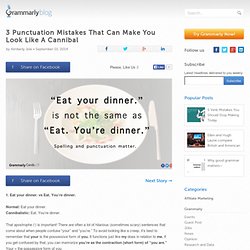

Svenska ordklasser – enkelt och lättförståeligt! Att läsa, skriva och kommunicera bättre. Att läsa, skriva och kommunicera bättre. What Is A Simile? Affect vs. Effect. Affect and effect are easy to mix up.

Here’s the short version of how to use affect vs. effect. Affect is usually a verb, and it means to impact or change. Effect is usually a noun, an effect is the result of a change. Watch out! There are certain situations and fixed phrases that break the general usage rules for these words. A Gender-Neutral Honorific. The gender-neutral Mx. is used as a title for those who do not identify as being of a particular gender, or for people who simply don't want to be identified by gender.

Pronounced to sound like mix or mux, the title Mx. (which, like other honorifics, is styled without the period in British English) is used increasingly on various official forms in the UK, including driver's licenses and banking documents. Although the earliest print evidence of Mx. is from a 1977 issue of an American magazine called Single Parent, the title has not seen much official or published use in the US. It did, however, appear twice recently in The New York Times: a June 4th article noted Mx. as someone's preferred honorific, and a June 5th article all about Mx. made it clear that the June 4th use was an exception. The title simply isn't familiar enough to the newspaper's readers to be fully adopted.
Difference between collocation, fixed expression and idioms? Thank you for your question!

Collocations, fixed expressions and idioms all relate to the combination of words. 7 Homophone Mistakes to Avoid. When you’re speaking out loud, homophones sound alike, but when you’re writing them out, it’s a different story.

Though they have the same pronunciation, homophones may have slightly different spellings and totally different definitions. Since using the wrong one can completely change the meaning of your statement, it’s important to make sure you have the right word in mind. Affect vs. Effect. Confusing Sentences That Actually Make Sense. Let’s face it: Sometimes the English language can be downright bizarre.

The plural of ox is oxen while the plural of box is boxes, ‘rough’ rhymes with ‘gruff’ even though the two words only have two letters in common, and there are actually more than nine hundred exceptions to the infamous “i before e except after c” rule. If you’re still not convinced that the English language is full of oddities and conundrums, take a look at these five wacky sentences that are actually grammatically correct. 1All the faith he had had had had no effect on the outcome of his life. Well, talk about lexical ambiguity. But as strange as this sentence might sound, it is actually grammatically correct.
Does grammar matter? - Andreea S. Calude. Spoken language has been neglected and marginalized for much of our history on account of its perceived inferiority in comparison to written language.

Written language was historically regarded as the language of the ‘learned,’ given that few people could read or write. 10 Best Grammar Resources for Professionals. No matter how much we language lovers might chafe at lax writing styles, the proper use of grammar carries different weight depending on the circumstances.

Even the most optimistic language lovers don’t expect to see a lot of correct grammar usage when they’re reading comments on YouTube or other websites. Grammar and text messaging or emailing also don’t necessarily go well together, and that can be perfectly fine, even if it makes us cringe. In a professional setting, good grammar carries more weight. Whether it’s in business correspondence, written reports, or articles for blogs or print, improper use of grammar can, and will, damage the credibility of the writing and the writer.
So, in the spirit of National Grammar Day, here are ten resources that anyone writing in a professional capacity can use to learn about grammar, practice it, or look up any dilemmas. 5 of My Favorite English Games for ESL Students. I saved the best for last.

My students requested this game more often than any other game we ever played. It's based on the old drinking game "Ring of Fire," modified for the classroom. Materials needed:A standard deck of playing cards, a whiteboard, 20-30 small slips of blank paper, and a bowl. The setup:Almost none! High-Frequency Words and Vocabulary. High-Frequency Words High-frequency words are the words that appear most often in printed materials.

According to Robert Hillerich, "Just three words I, and, the account for ten percent of all words in printed English. " Grammar rules and activities. Prepositions Made Easy: In, On, and At (with Video!) Eight ways to pronounce ough. Phrasalverbs. » Rhetorical Devices for Dummies: Making Comparisons. » 3 Punctuation Mistakes That Can Make You Look Like A Cannibal.
1.

Eat your dinner. vs Eat. 3 Awesome Grammar Visuals to Use ... June 21, 2014 There is a heated discussion around the teaching of grammar between two main camps. On the one hand, proponents of the "back to basics" movement argue that grammar is the backbone of language teaching and as such it should be given priority in terms of teaching grammatical structures explicitly through language activities and exercises that are designed purposefully to target these structures in a mechanical way. On the other hand, progressivists have a different take on this. They view grammar teaching and and literacy teaching in general as part and parcel of a natural process of learning that resembles kids learning of their mother tongues.
They claim that through engaging learners in meaningfully authentic activities, kids get to learn more effectively than is the case through mechanical drilling advocated by the traditionalists. 10 Words You Need to Stop Misspelling. Loose vs lose.